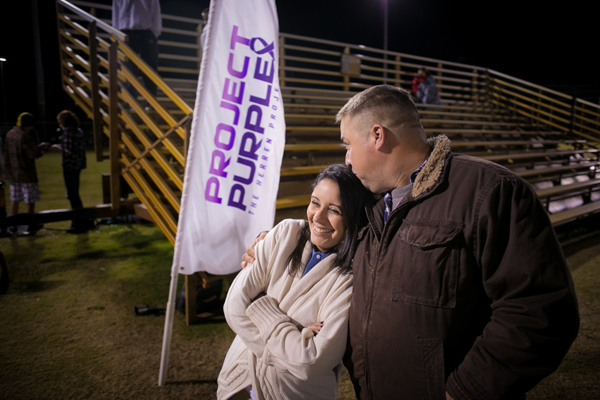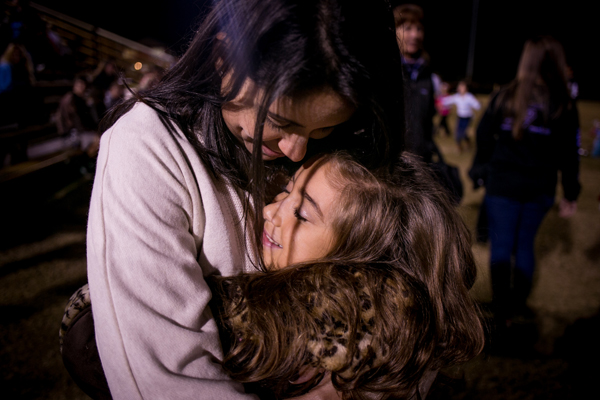A Dare County, N.C., wife and mother of three keeps her spunky, positive spirit intact during treatment for thyroid cancer, buoying herself, her family and her medical team on the journey.
For Salie Babilonia, “the look” gets her every time.
“You know the one I’m talking about,” said Salie, a wife and mother of three from Buxton, N.C. “You tell someone you have cancer, and you get that look of pity because it is scary and people don’t know what to say.
“But you don’t want people to pity you because it doesn’t really help them or you. Instead, pray for fast healing.”
It’s that spunky spirit that has seen the 5’1” dynamo breeze through surgery and radioactive iodine therapy for the treatment of papillary thyroid carcinoma at UNC Hospitals.
Salie, a real estate sales associate and “forever 25,” felt the knots in her neck as she and Carlos, 38, her husband of 16 years, were preparing for a two-week family vacation to their native Puerto Rico. Testing and scans, which included a biopsy, confirmed cancer.

She was referred to UNC Hospitals, and in June Salie had her thyroid gland and the lymph nodes on the left side of her neck removed by Carol G. Shores, MD, PhD, professor of otolaryngology/head and neck surgery in the UNC School of Medicine and a member of UNC Lineberger Comprehensive Cancer Center.
“My care at UNC Hospitals was incredible,” said Salie, ever the organizer who has kept everything related to her cancer journey neatly ordered in a binder. “I was never a number. Dr. Shores herself called to tell me the biopsy confirmed cancer. It was sucky that she had to share that news, and I felt bad for her.”
“Salie is very strong, very positive, and her surgery was uncomplicated,” Dr. Shores said. “She was hospitalized for six days because the parathyroid glands, which control calcium levels in the blood, get moved around during the surgery and their function can be temporarily impaired. Her parathyroid function recovered, and Salie has recovered.”
Papillary thyroid cancer is the only cancer staged by age, and women under age 45 are considered Stage 1 disease regardless of how much cancer in present and whether lymph nodes are involved, Dr. Shores said. “This cancer is not unusual in young women, and women under 45 have a good cure rate. They tend to do well in the long term, but the cancer can recur even 20 years after treatment, which is why life-time monitoring is required.”
Salie will take thyroid hormones for the rest of her life and will be monitored by Julie Sharpless, MD, assistant professor of endocrinology and metabolism.
In July, under the care of Arif Sheikh, MD, assistant professor and director of the targeted radionuclide therapy and a member of Lineberger, Salie received radioactive iodine treatment in pill form as a standard of care to destroy any remaining cancerous thyroid tissue that could have remained after surgery.
In preparation, her thyroid hormones were not replaced for about six weeks and Salie had to adhere to a strict diet, low in iodine which equates to a no-preservatives no-salt diet as most prepared foods contain iodized salt.
And that’s where the kitchen at SECU Family House came to the rescue. Carlos and Salie had already discovered the safe, supportive environment offered by the 40-room hospital hospitality house minutes from UNC Hospitals. Family House offers the home-away-from-home comfort needed by seriously ill patients and their families who come to UNC Hospitals for care.
“Essentially for those six weeks we had to prepare everything she ate from fresh, preferably organic ingredients and from scratch,” said Carlos. “We could do that easily enough at home, but to be here in Chapel Hill a few days before that therapy began, we couldn’t have done it without this kitchen. And the local resources for fresh, unprocessed ingredients were just what we needed.”
The radioactive iodine therapy required Salie to be hospitalized for monitoring the iodine uptake and because her body was radioactive, she needed to be isolated, especially from children.

By August, Salie and Carlos were back home settling back into their daily routines and time with their children Carlos Jr.,15; Enrique,13; and Calia,10.
“North Carolina is home,” said Carlos, who moved the family to Hatteras in 2009 with a career U.S. Coast Guard assignment. “We have a nice house, fruit trees in the backyard and a great network of friends who have helped us with the kids while Salie was being diagnosed and treated. The kids love it here, and even when I retire, we’re staying.”
“Family has always been first for us,” Salie said. “We only take vacations as family, and our kids tell us they want us to be their best friends. About the only time I’m not happy is if our kids aren’t happy. We’ve always been there for each other, putting the priorities where they need to be, learning the difference between needs and wants.”
“We grew up together and have always been each other’s go-to person,” said Carlos who knew from first time he saw Salie in college that he would marry her. “We’ve been together through the happy, the sad and the in-between. We’re still on the same page, but you have to work at it every day.”
And just as “the look” of pity too often given to cancer patients gets to Salie, there is another look that gets to her every time.
“She’s still the one, and this is forever,” said Carlos, holding Salie’s hand and meeting her eyes as if they were the only two in the room.
The original article from UNC Health Care can be found here. 
